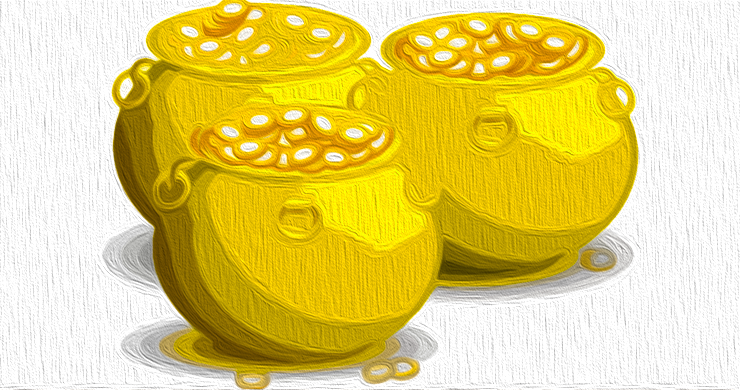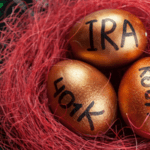History has shown us that there will always be people who want to take advantage of others by scamming them.
It's especially true in the world where people are often looking to make a quick profit.
To avoid becoming a victim of a scam when investing in precious metals, choose reputable companies.
Augusta Precious Metals
With Augusta, retirees receive personalized attention so they can get the most from their retirement accounts.
Lear Capital
Lear Capital offers its own Lear Advantage IRA plus various gold and silver special report services for both new and advanced investment options, helping you properly invest your money away from any potential scam.
We're reader-supported. When buying something through links from our site, we may receive commissions for referring people to the products sold through these links.
Gold has become increasingly popular as an investment vehicle in recent decades, which makes it a prime target for scam artists who take people's money by convincing them they're investing in something valuable when actually they're not.
It's important to know the most common types of gold scams so that you don't get scammed when buying gold online.
Furthermore, having the right investment app to track market trends and keep an eye out for potential scams can also help you avoid becoming a victim of fraud.
Here I'll go over some of the more common types of fraud involving precious metals and give you tips on avoiding them.
If you're interested in finding out everything there is to know about the gold IRA scams, here's a free report that you may find useful.
It's the same advice given by American former football quarterback and investor Joe Montana when he made his first investment in gold.
Well-Known Gold Scams
A number of banks and shadow banks in Mainland China were caught up in a massive gold scam centered in Wuhan.
Once a major player in the jewelry industry, Kingold was so large that it was able to be traded publicly on the Nasdaq stock exchange. It used its profits from trading to borrow several billion dollars to invest in China’s booming real estate market.
The problem: About $83 million worth of that collateral was reportedly fake.
When one of their borrowers ran into financial trouble, they called in the loan.
Kingold didn't have enough cash, so the bank took its collateral (the physical metal) and sold it off.
After inspecting them, the banks found out that most of the gold bars they had on deposit were actually made from gilded copper instead of solid gold.
There was no direct harm done to any individuals who invested in gold.
But the sheer size of the fraud – 83 tonnes of metal – shows just the extent to which people direct their time and energy toward fraud.
If 14 major financial institutions were so easily fooled, what chance does an individual retail gold buyer or seller have?
There is quite a bit you can do to protect your privacy online.
You shouldn't be lazy or gullible, either.
Most financial planners usually recommend some exposure to gold and/or precious metal in their clients' retirement plans.
Physical gold, silver, platinum, diamond, and other precious metal investments represent a way to diversify your portfolio against stock market risks, currency risks, and other dangers.
To protect yourself from gold scam artists, precious metal fraudsters, and counterfeit ring swindlers, you need to know what they're doing and why.
China is home to many of the world’s largest and most sophisticated gold scams.
Non-Delivery Scams/Ponzi Schemes
Most of these scams involve a Ponzi scheme where scammed individuals get paid for nothing.
One such example was when Northwest Territorial Mints' owners received millions in sales to deliver gold bullion coinage.
They lied about their delivery time but spent the profits from the scam on expanding into new states and buying expensive homes.
They used the extra cash from their new orders to pay off their old customers.
According to the U.S. Attorney’s Office for the Northern District of Illinois, Northwestern Mint defrauded over 2,500 customers by falsely telling them they could earn up to $1,000 per month from their investments. As a result, the company lost over $25 million and
Hannes Tulving of New Port Beach, California, was an entrepreneur who started his own business selling coins, bullion, etc., online.
Once again, Tulving's scheme began with failing to deliver the goods he had been promising his clients.
Instead, Tulving spent his money funding his lifestyle and keeping the scheme going until he ran out of funds.
When people asked him for an explanation, he would give them one of several different excuses and then deliver the product or refund their money only if they threatened to take legal action.
It was too late when the Justice Department became involved. He had already taken over $15 million from over 380 victims.
Lessons Learned
Make noise early.
Yes, there are sometimes delivery delays from legit dealers.
If you feel like you're being taken advantage of, it's much better to ask for a refund now, even if you have to resort to threatening legal actions, rather than be one of the last few who get stuck holding the bag when things go south.
‘Rare Coin' Valuation Scams
Unscrupulous sellers of rare coins may be able to persuade buyers to pay huge markups for rare coins.
Sometimes the gold dealers deliver coins of less value than they're worth.
Ordinary consumers cannot tell the difference between good quality and bad quality products.
A woman who was 70 years old when she sold her collection of Swiss gold coins for $10,000 was not too pleased by the offer.
He told her she'd get $8,500 for the coin collection, but the price of gold had dropped since the last time she sold them, so he couldn't sell them for any less than $10,000.
She suspected something was wrong, so she asked for her change back.
She demanded her coins back from the dealer when he refused to return them immediately.
At last, the casino gave her a different set of chips.
She was disappointed when she learned the new coin collection was worth less than $1,100.
She has not been able to recover any of the $1,000 she lost in the scam.
Bullion coins and bars are explicitly made for their precious metal contents and sell for very close prices to their spot prices.
Rare coins, proof sets, and collector coins are not for non-experienced investors.
Bullion products are usually bought at the market price, so there isn't much room for scammers to exploit people's lack of knowledge about the value of gold.
Gold IRA Scams
If you're interested in buying gold for an IRA, you might want to consider purchasing some from a bullion dealer.
If that’s the case, then it would be a good thing to get some help from an IRA company that specializes in helping people set up and manage their IRAs.
There are several reasons why this happens.
First, Congress has placed significant restrictions on the type of gold and precious metal allowed in IRAs.You cannot purchase any gemstones, jewelry, or collectible items except specific types of bullion coin investments for your IRA account. Your precious metal holdings must consist entirely of gold, silver, platinum, and/or palladium. They cannot include any other type of metal. To qualify for precious metal IRAs, you need to invest in gold, silver, platinum, palladium, rhodium, or iridium bullion coins, bars, or rounds that were minted at a U.S. Mint facility or assayed, refined, or manufactured by one of these companies. Proof coins must be complete and original mint packages in good shape, including certification of authenticity. Bullions must be manufactured to exact weights. Proof (bullion) coins need to be perfect without any marks or flaws.
Some unscrupulous or ill-informed precious metal sellers may try to pressure you into buying their expensive numismatic collectible items for your IRA.
These salespeople are just trying to get their commissions.
If you try to keep your coin collection within an IRA, you may be able to avoid taxes by keeping them there.
If that’s the case, then the IRS might disallow the entire IRA.
You could incur substantial income tax liabilities and penalties if you fail to file your taxes timely.
The Home Storage Gold IRA Scam
You must keep physical gold, silver, platium, or palladium in your possession at all times if you own them inside an IRA or other retirement fund.
You cannot personally possess your IRA assets.
They cannot be stored in a home safe or a safebox under your own personal custody.
Some precious metal dealers have been engaging in careless or misleading marketing for an investment product called a home storage IRA (HSIRA).
They say that you can store your precious metals at an independent storage company instead of keeping them at a bank or some other type of depository.
The recent ruling by the Supreme Judicial Council makes it clear: Trying to store precious metals inside your house is illegal.
If you want to keep your gold bullion and other precious metal holdings safe from creditors, you can put them into your own name outside a retirement plan.
If you're holding physical assets in your self-managed IRAs, 401(k)s, SEPs, or SIMPLES, you shouldn't touch them at any time.
If you want to avoid selling the physical metal, you can ask your precious metal IRA custodian to hold onto the assets for you.
Affiliate Scams
Criminals exploit affiliations to build credibility, and then they target their victims.
Scammers often take full advantage of people within a religious group, a synagogue, or a veterans' organization.
People tend to trust people who look like them, so they're particularly susceptible to con artists and scamsters.
For example, Larry Bates, together with his family, heavily promotes his precious metal business, First American Monetary Consulting, through Christian and Jewish televisions and radios.
He held conferences and sold his message to religious groups across the United States, spreading fear of an impending economic crash and urging people to buy gold coins.
He was a good salesperson: Between 2007 and 2013, he sold his company for more than $87 million to another company.
He wasn't a good steward of their funds: According to the Justice Dept., he diverted their funds for his own use and investments.
He created an international radio network to further promote his family’s scams, and he built a 10,000 sq ft mansion on 300 acres in Tennessee for himself.
By 2009, the firm had already stolen millions from its investors by failing to deliver on its promises of selling gold and precious metal products.
The family was eventually sent to prison for a total of 627 years.
Affiliate schemes aren't just for religious organizations. They're also used by scammers who want to exploit people's trust in fellow minorities.
Counterfeiting
There are multiple large, sophisticated counterfeit rings operated by corrupt state and banking officials from both China and Africa.
But the problem isn't limited to just those areas: Counterfeiting operations run virtually everywhere in the globe. Silver and gold dealers must stay vigilant at all times.
A 34-year-old man from Morristown, New Jersey, was convicted of importing and distributing counterfeit silver Morgan dollars.
He also confessed to selling fake gold bars to another buyer for 11,000 dollars in cash.
The twist: He was also convicted of impersonation of a federal officer. When meeting with potential clients, he would wear a false ATF badge to trick them into thinking he was an actual government official.
Others who are well-funded are actually counterfeiting bars using actual precious metals. Only the markings are fake.
The scheme allows criminals from countries without any banking regulations to move their funds into accounts in countries where they face stricter rules.
Many counterfeits of precious metals come from China, particularly fake bullion coins. These criminals often use cheap materials such as lead, tungsten or even aluminum to create their fakes. They then coat these base metal objects with a thin layer of real silver or 24-carat (24%) pure white or yellowish-white colored plated material.
Many of these coins are bought online rather than in stores.
If you're looking for high-quality coins, experienced gold buyers can usually tell if a piece is fake just by its appearance.
Even if that method fails, savvy coin collectors often use scale and measuring devices to determine exactly how heavy and thick their coins are, which is extremely difficult for counterfeit artists to replicate.
But criminals who sell fake coins online don't have that problem. It's easy to spot counterfeits online.
And the picture on the site may not be a real one. If you get the actual item, then it might be different than what was shown.
People often purchase very convincing fakes online and don't even know they've been duped for several decades. When they attempt to sell the fake coin, however, they're usually told it's not real.
They learn it's not real from their neighborhood drug dealers right when they need the cash. Buy only from established and reputable dealers. Read online reviews from trusted websites. Get yourself a good digital camera so that you can take photos of any suspicious items. Look out for any transactions where the seller is offering their coin or bar at a lower price than the current market value.If you're buying precious metals for investment purposes, make sure the company selling them is registered with the National Futures Association. Buy a scale and caliper. Know the exact weight of every penny you consider buying. For instance: One ounce (28.3 g) of 24-karat gold coinage should weigh exactly 31.1 g.A kilogram (kg) of pure 22k solid 24kt yellow or white metal bullion coinage weighs approximately 32.2 g, which means that one gram of 22k solid 24kt coinage is worth $1,000.00 USD.
Gold Scam Warning Signs
Beware of anyone who tries to tell you that investing in precious metals is not risky. It is. Precious metal prices do fluctuate. There is nothing backing the value of your investment. You could lose money.
Based on an article from https://www.adamenfroy.com/gold-ira-scams

















